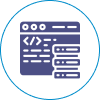Many different sectors that need websites and web-based applications need front-end PHP engineers. Front-end
PHP developers are frequently in demand in the following industries:
Sturdy, user-friendly, scalable, and secure web platforms are essential for online
retail enterprises. These e-commerce websites are designed and maintained largely by front-end PHP
developers.
To work on their web-based platforms, services, and products, companies in the
technology industry frequently employ front-end PHP developers. This covers both recently founded
and well-established IT companies.
Front-end development for financial institutions' and banks' web portals, banking
apps, and consumer interfaces needs to be dependable and safe. Many fintech (financial technology)
solutions use PHP.
PHP is used by healthcare institutions, such as hospitals, clinics, and medical
software businesses, to create applications for managing medical records, appointment scheduling,
and patient portals.
Learning management systems (LMS), student portals, and instructional resources
are developed using PHP by educational institutions and e-learning platforms.
PHP is used by businesses in the travel sector to create booking engines, travel
portals, and reservation systems that need to have strong functionality and user-friendly
interfaces.
To guarantee seamless user experiences, media and entertainment companies
frequently have interactive websites, streaming platforms, or content management systems (CMS).
These platforms call for proficient front-end PHP developers.
Marketing and Advertising:
To create engaging user experiences, marketing agencies and advertising companies
frequently utilize PHP for front-end development when creating unique websites and interactive
campaigns.
Freelance and Consulting:
A large number of front-end PHP developers operate as independent contractors or
consultants, providing their skills to a wide spectrum of customers in different sectors.
Exclusive list of Interview Questions asked when you Hire Front-End PHP Developer in India
What are the key differences between front-end and back-end development?
"Front-end development focuses on the user interface and user experience, involving HTML, CSS, and JavaScript.
Back-end development handles server-side logic and database interactions, using languages like PHP to process
data and generate dynamic content."
Explain the importance of HTML5, CSS3, and JavaScript in front-end development.
"HTML5 provides semantic structure for web content, CSS3 styles this content, making it visually appealing and
responsive, and JavaScript adds interactivity and dynamic behavior to web pages, enhancing user experience."
What is the role of PHP in front-end development?
"PHP primarily serves as a server-side scripting language, enabling dynamic content generation, handling form
submissions, interacting with databases, and integrating with external APIs, thereby enhancing the functionality
of web applications."
How do you optimize front-end performance in PHP applications?
"Optimizing front-end performance involves techniques like minimizing HTTP requests, leveraging caching
mechanisms, compressing assets, using asynchronous loading for resources, and ensuring efficient client-side
scripting practices."
Describe your experience with front-end frameworks/libraries. Which ones have you used?
"I have experience with frameworks like Bootstrap for responsive design, jQuery for DOM manipulation and AJAX
calls, and Vue.js for building interactive user interfaces. Each framework has its strengths, and I choose based
on project requirements."
How do you handle cross-browser compatibility issues in your front-end development?
"I ensure cross-browser compatibility by using modern CSS techniques like flexbox and grid, testing on multiple
browsers during development, and using polyfills or fallbacks where necessary. I also follow best practices and
stay updated with browser updates."
Can you explain AJAX and how you've used it in your projects?
"AJAX (Asynchronous JavaScript and XML) allows web pages to be updated asynchronously by exchanging small amounts
of data with the server behind the scenes. I've used AJAX to dynamically fetch data, validate forms without
reloading the page, and enhance user interaction."
How do you handle security concerns in front-end PHP development?
"I prioritize security by sanitizing and validating input data to prevent SQL injection and XSS attacks. I also
use HTTPS for secure data transmission, implement CSRF tokens, and regularly update dependencies to mitigate
security vulnerabilities."
Describe a challenging front-end problem you faced and how you solved it.
"In a recent project, optimizing the rendering performance of a complex web application was challenging. I
identified bottlenecks, optimized JavaScript code, and implemented lazy loading for non-essential resources.
This significantly improved page load times and user experience."
How do you stay updated with the latest trends and technologies in front-end development?
"I stay updated by regularly reading tech blogs, participating in online forums like Stack Overflow, attending
webinars, and experimenting with new tools and frameworks in personal projects. Continuous learning is crucial
to staying competitive in front-end development."
Frequently Asked Questions
What skills should a front-end PHP developer possess?
- Proficiency in PHP frameworks like Laravel, Symfony, or CodeIgniter.
- Strong understanding of front-end technologies such as HTML5, CSS3, JavaScript, and jQuery.
- Experience with version control systems (e.g., Git) and package managers (e.g., Composer, npm).
What are the typical responsibilities of a front-end PHP developer?
- Developing and maintaining dynamic web applications using PHP frameworks.
- Writing clean, well-documented code that follows best practices.
- Integrating user-facing elements with server-side logic.
- Collaborating with back-end developers and designers to improve usability.
How important is knowledge of JavaScript for a front-end PHP developer?
Knowledge of JavaScript is crucial for front-end PHP developers because it's used extensively to create
interactive elements on web pages. It complements PHP by handling client-side scripting and enhancing user
experience.
What experience level should we look for in a front-end PHP developer?
This depends on the complexity of your projects. Junior developers may be suitable for simpler tasks and can
learn on the job, while senior developers bring extensive experience in architecture, scalability, and
optimizing PHP applications.
What questions should I ask during a front-end PHP developer interview?
- Can you explain your experience with PHP frameworks? Which ones have you used?
- How do you ensure the security of PHP applications?
- Have you worked on optimizing PHP performance? If so, what techniques did you use?
- Can you describe a challenging front-end integration problem you solved using PHP?
What are some red flags when hiring a front-end PHP developer?
- Lack of experience with popular PHP frameworks or outdated knowledge.
- Inability to explain basic PHP concepts or provide examples of previous work.
- Poor communication skills or inability to work effectively in a team.
How do I assess the technical skills of a front-end PHP developer?
- Conduct technical assessments or coding challenges focused on PHP and relevant frameworks.
- Review their portfolio and ask for examples of projects similar to what you need.
- Discuss specific technical scenarios to gauge problem-solving abilities.
What soft skills are important for a front-end PHP developer?
- Effective communication skills for collaborating with team members and stakeholders.
- Adaptability to learn new technologies and frameworks as needed.
- Attention to detail and ability to write clean, maintainable code.


































